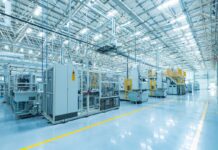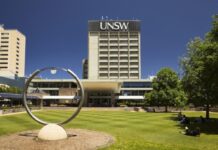Media Release
Co-hosted by the NSW Smart Sensing Network (NSSN) and Australian Academy of Technology and Engineering (ATSE), Towards a Waste-Free Future: Technology Readiness in Waste and Resource Recovery was held on 27 April 2021 at Sydney Startup Hub.
The event brought together a team of research and industry partners developing a world-first technology to enhance Australia’s plastic recycling capability.
Parliamentary Secretary to the Premier Gabrielle Upton MP opened the event and congratulated the NSSN on the Increased Recycling of Plastics by Sensing and Treating Label Contamination project.
Ms Upton said, “I understand the power of the work you are doing having served as Environment Minister in NSW.
“It was gratifying to hear about the innovative solution showcased at the forum which came about through industry, university and Government collaboration.”
Project partners and industry experts from PEGRAS Asia Pacific, Labelmakers Group, Dairy Australia, Bega Cheese Limited, Lactalis and Saputo participated in the event.
Dairy Australia Program Manager for Manufacturing Innovation & Sustainability, Mr Ian Olmstead, delivered a keynote speech and said Australia’s National Packaging Targets had generated momentum for the industry to address packaging challenges.
“With the support of the Commonwealth and partnerships between industry, research and technology providers, Australians are making some incredible inroads into sustainable packaging,” said Mr Olmstead.
Director and Technology Consultant at PEGRAS Asia Pacific, Mr Ian Byrne, introduced the project and said label contamination is a significant issue in the recycling process. “The aim is to increase the recycling rates for milk bottles by sensing and treating label contamination,” said Mr Byrne.
“This project focuses on natural HDPE, which is predominantly used by the dairy industry. However, our findings will transfer to other plastic types.”
The event continued with researchers from the University of Sydney, University of Technology Sydney (UTS) and University of New South Wales (UNSW) showcasing the world-first outcomes of the industry-led R&D project.
Researchers from the University of Sydney have developed an innovative method for sensing residual glue levels on recycled milk bottles and created a new wash chemistry for label delamination.
Researchers at the University of New South Wales have used a supercomputer to model and understand the forces governing the washing process and have designed a laboratory test rig that will be fundamental to label innovations.
The University of Technology Sydney researchers have embarked on a first-time study to view the material flow analysis of milk bottles in isolation. The study helps the researchers to map a milk bottle’s journey from the curbside pick-up to the post-recycling market.
The event concluded with a panel discussion featuring speakers from the University of Sydney, Labelmakers Group, and Bega Cheese Limited.
Q-R&D Packaging & Technology Director at Bega Cheese Limited Mr Ad van Dijk said labels are an essential part of the packaging as they provide consumers with necessary information about the product.
“When you buy milk, you want to know about the nutritional information, and that’s the reason why we need labels,” Mr van Dijk said.
“We also know that the label is contaminating [the milk bottle]. It’s important to resolve the contamination problem to enhance the recycling of HDPE.”
The Increased Recycling of Plastics by Sensing and Treating Label Contamination project is coordinated by the NSW Smart Sensing Network, led by Pegras Asia Pacific and has received funding through the Federal Government’s CRC-P Grants program.




















